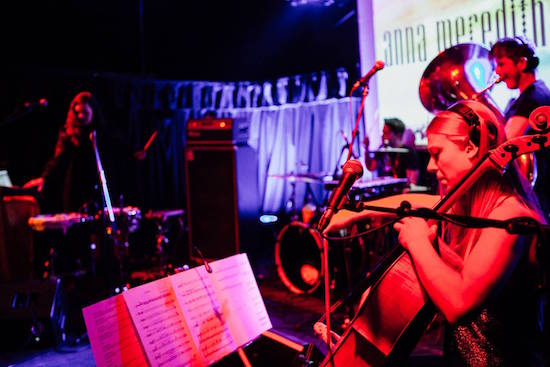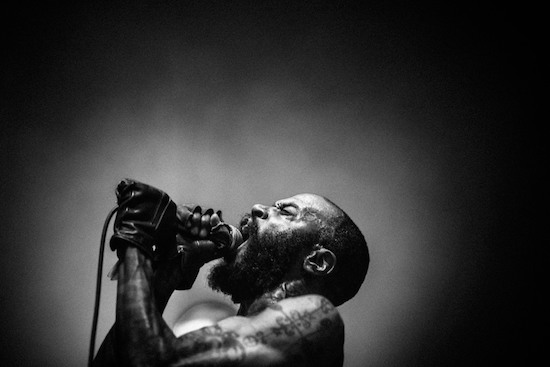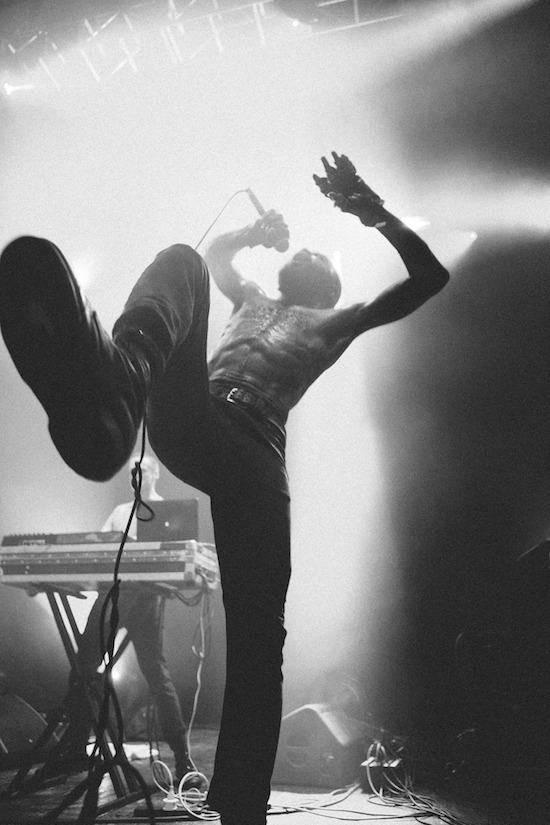In a year where simplification of the issues – the wholesale black-and-whiteing of matters that reside firmly in the greyest of areas – has taken root and seemingly prevailed in the transatlantic conscious, it’s more than a little welcome for a festival like Simple Things to provide both a parallel and a counterpoint. In its sixth edition, the one-day Bristol event not only moves to reclaim the word, but also to imbue it with an extra sense of nuance and poke fun even at the possibility that those “simple” things can exist.
Spanning venues across the centre of town, the program this year intertwines the straightforward and the complex, with festival-goers and stage curators alike clearly in possession of a drive toward a kind of pure, hedonistic pleasure and a desire to cultivate, highlight, and bring together the best of 2016’s emerging talent alongside more familiar names, creating a continuum of indulgence and intellectualism even while streamlining the schedule somewhat compared to previous years.
As with life in general, sometimes this works and other times it doesn’t quite come off: reality is a harsh mistress and clashes, queues and (though infrequent at this particular festival) sub-par venues still act as a gentle pin prick, which – though never actually doing so – serves as a reminder that the bubble could burst at any second. But this precariousness, as much as anything, is to be celebrated. Karl Smith
Dance dominates but doesn’t always connect
With a slightly more streamlined line-up than previous years, it’s safe to say that this year’s Simple Things lacked the sheer sonic diversity of previous editions of the festival. While 2015’s event saw grubby skronk-rock from Sex Swing line up against the placid tones of Penguin Café Orchestra and the pummelling techno of Objekt, this year’s crop is dominated altogether by dancier acts. I couldn’t have been the only one, for example, who was disappointed that the Boris playing this year’s Simple Things was not the Japanese sludgegaze group but a Berlin techno DJ.
Still, within this dance-dominated remit, a few idiosyncratic acts were able to shine through. It was certainly a pleasure to watch Squarepusher’s Shobaleader One project unleash their zesty blend of Mahavishnu Orchestra/Weather report-inspired jazz fusion on an unsuspecting crowd. Better still was watching people attempt to dance to it. Yet the biggest court jester of the Firestation venue was undoubtedly abrasive techno don Powell, who performed live. His mixture of grainy noise-rock samples, acidic beats and gloopy noise proved to be a very strong medicine, particularly for those who had failed to keep their powder dry. Sickening, warped visuals provided the perfect complement to his music, which veered dangerously between time signatures and bpms, with all-out Wolf Eyes-esque blasts of noise confounding many.
And yet, while admittedly powerful and unarguably enjoyable, there were perhaps some elements of Powell’s braggadocio that left a slightly sour taste. As was noticed in Rory Gibb’s recent Lead Review on his recent debut album Sport , there’s something knowing and distanced about Oscar Powell’s take on heavy dance music that means it’s hard to generate any real level of feeling toward it other than appreciation for its brutish power. Stalking the stage like a boxer, throwing his arms in the air in true superstar-DJ fashion, I can’t help feeling that he’s having us on a bit. As a spangled crowd applaud his every drop and blast of noise even as they struggle to make sense of the disorienting beats he throws at them (he even knocks his consoles off his desk, multiple times), one gets the unavoidable sense that there are too many levels of irony between the stage and the dancefloor. Danny Riley

Kano may have been made in the Manor but he certainly isn’t confined to it
Knowing that in just a few weeks Kano will find himself performing alongside PJ Harvey at Valshöllin — Reykjavík’s closest companion to Wembley Arena — as part of 2016’s Iceland Airwaves, it’s strange now to be watching one of the East End’s finest contemporary exports playing at something more like a glorified (albeit temporarily) fresher’s club. But, while Kano’s music may have been defined by time and place, the sonic result of a very particular geography, the confines of his surroundings no longer define him.
The floor may be sticky and the air still slightly thick with discount drinks no longer on offer (as well as their inevitable tragic results), but it’s Kano’s maturity and sense of purpose — things which have come much closer to the fore with the release of this year’s Made In The Manor, his first album since 2010’s Method to the Maadness — that define his performance at Simple Things. A refined sense of vitriol tempers a genuine, minutiae-level understanding and deep affection for the place he calls home – its dark corners and its sunlit summers – and the people who inhabit it.
It’s a tribute to a place, but one – through Kano’s raw delivery, his distinct, simmering, energy and his ability to conjure and convey the East End in a way that resonates on a less specific and more universal level – that is never allowed to stray into nostalgia or sentimentality. KS
Maximalism, minimalism, and nothing in between
After the sonic warfare of Powell, it was off to The Lantern to take in the less dancey end of things. If the puckish Powell was Simple Things’ arch jester, then Anna Meredith’s honest-to-God stage presence and maximalist prog-pop was the perfect antithesis. Positively gushing her thanks to the crowd between songs, the Scottish composer seemed visibly overwhelmed by the rapturous response she received. Comprising largely of cuts from her 2016 album Varmints, Meredith’s set was buoyed along by a formidable ensemble who navigated head-spinning time signatures with unabashed honks of tuba, stabs of cello, and whirling circus-ground organ. What’s more, the poptimistic nature of Meredith’s songcraft is complemented by a playful approach to composition, with the whole thing coming off like Moondog reinterpreting Aqua.

Many hours later in the same venue, Karen Gwyer electrified a smaller and flagging crowd by going the opposite way: achieving maximal results with minimal means. Her sound has evolved far beyond the psychedelic electronica she was known for when she came onto the scene a few years ago, having morphed into a streamlined, almost nihilistic take on high-bpm techno. For almost the whole of her hour-long set, Gwyer insists on the same four-note arpeggio, often realised in classic acid bleeps. With slow, near-imperceptible changes, she builds a formidable lattice of mechanistic beats around the maddeningly repetitive phrase. She doesn’t seem to be doing much, but it’s strangely compelling to see her work this magic on a crowd with the most minimal take on techno this side of Richie Hawtin.
With these more extreme acts providing the biggest thrills of the festival, the more nuanced acts tended to fall by the wayside. For example, the ponderous post rock of Suuns, though kinetic, came off as a little too cerebral. Likewise, Jessy Lanza’s perfectly serviceable electro pop failed to capitalise on its heavier potential of her more footwork-influenced work. Helena Hauff battered heads in Lakota, but for the festival-goers with no rave left in them Charlotte Church proved a surprisingly persuasive proposition. After all, someone who can assemble a medley out of the song from Charlie and the Chocolate Factory, ‘White Rabbit’, Girls Aloud and ‘Hometown Unicorn’ at least deserves the kudos of a drunken sing-along. DR

Whatever Death Grips lost, they seem to have it back
Speaking to friends at The Christmas Steps pub, confessing my excitement at seeing what MC Ride, Zach Hill and Andy Morin are going to pull off this evening, I’m both cautioned not to expect too much — the term "car crash" is bandied around, but everyone knows it’s impossible to look away from those events as they unfold in realtime — and informed that when Death Grips were announced for Simple Things, ticket sales went through the roof. A band that were primed, with their early releases, to potentially be one of the 21st century’s most important acts but faded into relative obscurity (or, rather refused to leave it), their genuine and righteous animosity shifting somewhere along the line to become what felt like aimless confrontation for its own sake, reports of their musical death have been greatly exaggerated.
At least half of what I’ve been told proves true from the off: there are certainly people at Colston Hall. What feels like a significant portion of the entire festival audience – now a pulsating human mass of uncertainty and nervous energy, as well as the more artificially-induced fervour – have turned up to see something which, regardless of how it turns out, with Death Grips as mercurial as they are, they may never have the chance to see again. The other half, however, is fundamentally wrong: whatever energy the crowd are carrying with them on entering that space, which Death Grips dominate relentlessly for the duration, Ride choking his microphone like it’s wronged him terribly in some past life, is returned to them tenfold as payment for their faith.
Explosive yet concentrated, it would be wrong to say that Death Grips have reigned themselves (or the on-stage versions of themselves) in: their ferocity remains untempered, their music and their presence as incendiary as ever, but what they deliver tonight at Simple Things feels less random (though no less Total) in its assault. This is the same raw power that the trio have always been capable of unleashing upon the world, but whether the times we live in and the unstable knife-edge upon which we all now seem to be constantly perched are a unifying factors that have given them new focus, in 2016 Death Grips are a force to be reckoned with. KS


